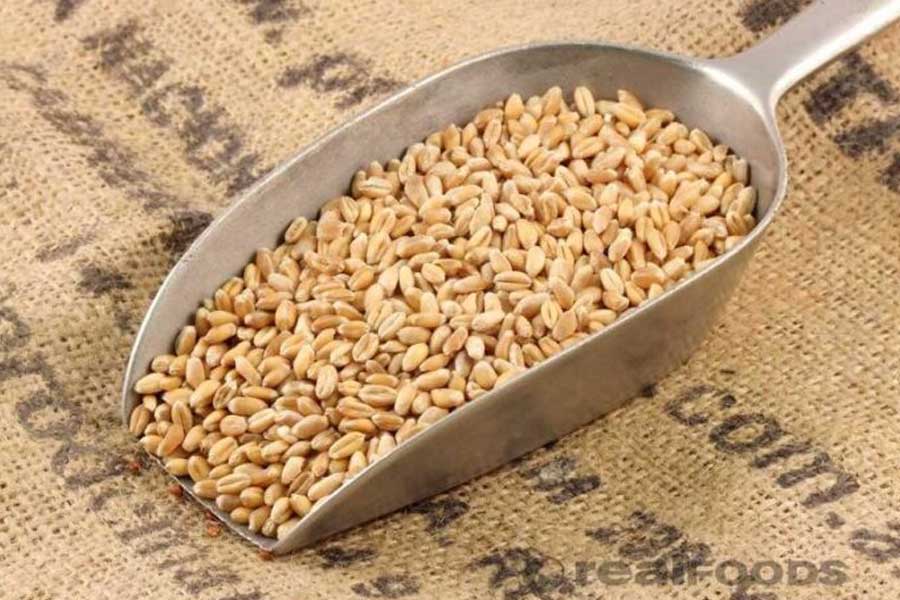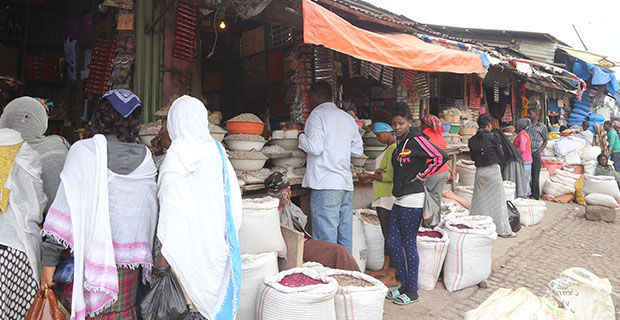
Dec 5 , 2020
By FASIKA TADESSE ( FORTUNE STAFF WRITER )
The prices consumers pay for widely used goods and services rose by 19pc in November, according to the latest report from the Central Statistical Agency (CSA). The year-on-year inflation rate showed a 0.3-percentage-point dip compared to the previous month.
Measured by the Consumer Price Index (CPI), headline inflation indicates the cost of living by measuring the average changes in the price for a basket of goods and services that consumers purchase. The survey indicates that food inflation accelerated to 22.1pc, a percentage point slide from the previous month. In contrast, non-food inflation came in at 15.1pc, a bit higher than the rate registered in October.
Prices of some cereals showed a slight decline in the last month, and this has contributed significantly to the stabilisation of food prices, according to the Agency's report.
"Vegetables and some pulse types registered a decrease in their price," reads the report. "On the other hand, the rise in the prices of sugar, imported edible oil, potatoes and coffee has contributed to an increase in the rate of inflation."
Non-food inflation rose mainly due to a price hike for alcohol and tobacco; khat; housing repair and maintenance; energy; medical care; and gold, according to the report, which also indicated that the cost of transport dropped last month.
The month-on-month general CPI, which measured the price changes between October and November, has shown a 0.4pc increase.
Alemayehu Geda (Prof.), a prominent macroeconomist and university professor, disputes the credibility of the report. He argues that there is no way that the rate could have gone down last month since there were numerous reasons that could potentially have caused the pace to snowball higher.
The macroeconomist mentions the ongoing conflict in the northern part of the country, which has created uncertainty, leading people to purchase more; the imported inflation that is mainly driven by the continuous depreciation of the Birr against a basket of major foreign currencies; and the continuing effects of COVID-19 as reasons for higher inflation rate.
"The weight of food inflation in the CPI is about 55pc," Alemayehu told Fortune. "And from our practical experiences, the price of food items has significantly spiked."
On top of the foreign currency shortage and high unemployment, inflation is one of the major problems facing the administration, which is targeting to confine the headline rate to the single digits at 9.8pc this fiscal year. This is despite the average 15.5pc rate that has been registered over the past decade and a half.
Last fiscal year's rate was even higher than the 15-year average, standing at 19.9pc, primarily driven by the growth of food inflation that marked a 23.3pc rate and a 15.8pc non-food inflation rate.
Fikadu Digafe, the chief economist and the vice governor at the National Bank of Ethiopia, says that the regulatory bank is employing a tight monetary policy to control the inflationary pressure on its part.
"We can control the inflation that comes due to higher money circulation," Fikadu told Fortune. "Our role, in this case, is employing a tight monetary policy. It's tight now."
As of the beginning of this fiscal year, the Ministry of Finance announced that it has stopped borrowing money from the central bank to cover the budget deficit. As an alternative, the budget gap is covered by the funds raised through the sale of the recently reformed treasury bill (T-Bill) market. The government has made the yield rate of the T-Bill market-driven, reversing the previous trend where the bank determined the yield rate arbitrarily.
However, Alemayehu calls for an independent peer review of the report by statistical economists before it is released and moving the accountability of the Agency to parliament, switching from the existing executive organ.
PUBLISHED ON
Dec 05,2020 [ VOL
21 , NO
1075]


Fortune News | Jun 19,2021

Fortune News | Apr 17,2021

Radar | Dec 14,2019

Fortune News | May 04,2019

Commentaries | Jul 17,2022

Fortune News | Oct 05,2019

Commentaries | Jul 19,2025

Radar | Nov 09,2019

Fineline | May 25,2019

Dec 22 , 2024 . By TIZITA SHEWAFERAW
Charged with transforming colossal state-owned enterprises into modern and competitiv...

Aug 18 , 2024 . By AKSAH ITALO
Although predictable Yonas Zerihun's job in the ride-hailing service is not immune to...

Jul 28 , 2024 . By TIZITA SHEWAFERAW
Unhabitual, perhaps too many, Samuel Gebreyohannes, 38, used to occasionally enjoy a couple of beers at breakfast. However, he recently swit...

Jul 13 , 2024 . By AKSAH ITALO
Investors who rely on tractors, trucks, and field vehicles for commuting, transporting commodities, and f...

Oct 11 , 2025
Ladislas Farago, a roving Associated Press (AP) correspondent, arrived in Ethiopia in...

Oct 4 , 2025
Eyob Tekalegn (PhD) had been in the Governor's chair for only weeks when, on Septembe...

Sep 27 , 2025
Four years into an experiment with “shock therapy” in education, the national moo...

Sep 20 , 2025
Getachew Reda's return to the national stage was always going to stir attention. Once...